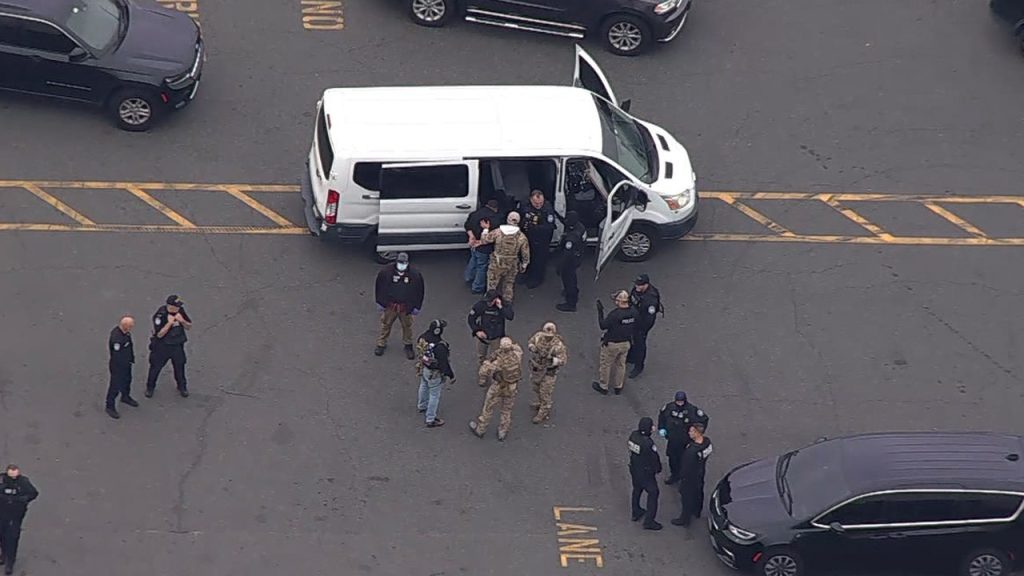Immigration Enforcement Intensifies with New Jersey Warehouse Raid
In a significant immigration enforcement operation, federal authorities arrested 46 undocumented workers during a Department of Homeland Security (DHS) raid at a freight warehouse in Avenel, New Jersey. The operation, which took place on Wednesday, was part of the agency’s ongoing efforts to ensure compliance with immigration regulations within the supply chain sector. These workers represented approximately 22% of the warehouse’s entire workforce, highlighting the substantial presence of undocumented labor within some industries. The detained individuals were placed in federal custody to await immigration proceedings, continuing a pattern of increased workplace enforcement actions across the country.
The scene at the New Jersey freight warehouse was tense as federal officers escorted groups of workers into multiple waiting vehicles. Surveillance footage captured the heavy law enforcement presence that surrounded the facility during the operation. The DHS described the inspection as part of their broader mission to “safeguard the integrity of the supply chain and verify that warehouse operators are adhering to all applicable security requirements.” This statement underscores the federal government’s dual focus on both immigration enforcement and supply chain security concerns, particularly at facilities authorized to handle international freight. However, federal officials notably withheld the name of the company operating the warehouse and did not indicate whether the employer would face any penalties for employing undocumented workers.
This raid represents the latest in what appears to be an intensifying nationwide campaign targeting workplace immigration violations. Just two months prior, federal agents conducted a similar but larger operation at a Hyundai-LG battery factory in Georgia, where they detained 475 individuals suspected of being in the country illegally. Most of those detained were reportedly South Korean nationals. These coordinated actions suggest a strategic shift toward more aggressive workplace enforcement of immigration laws, potentially signaling a new priority for federal immigration authorities. The pattern raises questions about which industries might be targeted next and how employers across various sectors might respond to increased scrutiny.
The human impact of such operations extends far beyond the statistics. For the 46 individuals detained in New Jersey, the raid likely represents a profound disruption to their lives and livelihoods. Many undocumented workers have established roots in their communities, supporting families and contributing to local economies despite their immigration status. When workers are suddenly detained, the ripple effects can touch families, employers, and entire communities. Children may be left without parents, households may lose their primary breadwinners, and businesses may struggle with sudden workforce shortages. These personal hardships often remain invisible behind the official announcements of enforcement actions.
From a policy perspective, these raids highlight the tension between immigration enforcement priorities and the economic realities of many American industries. Certain sectors—including agriculture, food processing, construction, and logistics—have historically relied heavily on immigrant labor, including undocumented workers. The DHS statement emphasized their commitment to “maintaining the highest levels of security and accountability within bonded facilities to protect both U.S. commerce and the public.” This framing positions the operations as necessary security measures rather than purely immigration enforcement, potentially reflecting an attempt to balance different policy objectives. However, critics might question whether large-scale workplace raids effectively address systemic issues within the immigration system or merely disrupt communities and businesses.
The increasing frequency of these operations raises important questions about the future direction of U.S. immigration policy and enforcement strategies. With these high-profile raids occurring in different regions and industries, employers nationwide may be reassessing their hiring practices and compliance measures. Meanwhile, immigrant communities face heightened uncertainty and fear. As federal authorities continue to prioritize workplace enforcement, the broader debate about comprehensive immigration reform—which could provide pathways to legal status for undocumented workers while addressing labor market needs—remains unresolved. Until such systemic solutions emerge, operations like the New Jersey warehouse raid will likely continue to represent the complex intersection of law enforcement, labor economics, and human lives caught in between competing policy priorities.


